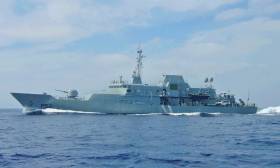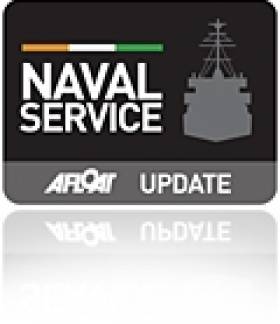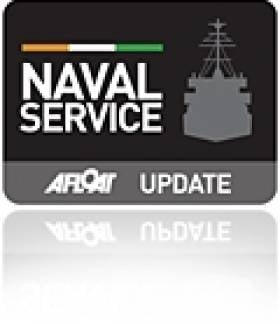Displaying items by tag: LE Orla
Farewell LE Orla (P41) and LE Ciara (P42) as Navy Vessels Depart Cork Harbour for Scrapping
On Sunday afternoon, Cork Harbour was poignantly reminded of passing times as the now decommissioned LE Orla (P41) and LE Ciara (P42) were led out of their home port for the last time, heading overseas for disposal at a scrap recycling facility.
Both Peacock-class patrol vessels have been in service with the Irish Naval Service around the Irish coast since 1989.
As Afloat reported in December 2023, the decommissioning of the 712-tonne sister ships was partly due to their age, coincidentally all built in 1984; in addition, the vessels were taken out of service due to the ongoing crewing crisis that has impacted the service, which has led to not enough sailors to crew all its ships.
A Port of Cork pilot boat escorted the ships out of Cork Harbour in a relatively calm sea, with tugs fore and aft.
 LE Orla (P41) and LE Ciara (P42) depart Cork Harbour
LE Orla (P41) and LE Ciara (P42) depart Cork Harbour
Naval Service Vessels Kept At Base Due To Crew Shortages
#Navy - According to The Irish Times, two Naval Service vessels were prevented from leaving their Haulbowline base last week due to crew shortages.
The LÉ Orla and LÉ Niamh were both kept at their docks while reserve members were drafted to cover shortages on the flagship LÉ Eithne.
Last week’s situation — linked to a reduced level of personnel retention — is a symptom of a bigger problem within the Defence Forces, The Irish Times reports, with one lieutenant colonel saying the command structure “is breaking down”.
The Irish Times has much more on the story HERE.
Navy’s Night-Time Detention of Belgium Fishing Vessel
In March another foreign-flagged fishing vessel, the UK registered Lynn Marie was detained on the same grounds for an alleged breach of fishing regulations by the L.E. Orla (P41). The Lynn Marie was escorted by the Peacock –class coastal patrol vessel (CPV) into Dun Laoghaire Harbour and similarly the custody of the vessel was transferred to the Gardai.
So far this year the Naval Service has carried out 852 boarding's and eight detentions of vessels off the Irish coast. In 2010 the navy conducted 1666 boarding's which resulted in warnings to 70 vessels and eight detentions.
Navy Escort Detained Trawler to Castletownbere
Less then a month ago the Naval Service detained a Northern Irish registered fishing vessel the Lynn Marie seven miles east off Bray Head. Onboard was a crew of 4 UK nationals who were taken into custody to the Gardai after the trawler was escorted by the CPV L.E. Orla to Dun Laoghaire Harbour. To read more about this detention click here.
Ironically the L.E. Orla was a former Royal Naval vessel, HMS Swift (P241) which was deployed on her first assignment to the Hong Kong Patrol Squadron for a four-year period. In 1988 Margaret Thatcher's Conservative Party Government disposed HMS Swift and HMS Swallow (P242) to the Irish Naval Service. The pair were built by Hall Russell Shipyard of Aberdeen as part of an eight 'Peacock' class coastal patrol vessel (CPV).
The 'Peacock' pair were commissioned into the Naval Service and renamed L.E. Orla (P41) and L.E. Ciara (P42) in a ceremony attended by An Taoiseach Charles J. Haughey at the Naval Base in Haulbowline, Cork Harbour.
This weeks' detention is the second conducted by the Naval Service in 2011. Last year the Naval Service carried out 1,666 vessel boardings which resulted in 70 warnings and eight detentions.
- Irish Naval Service
- Cork Harbour
- Northern Ireland
- Haulbowline
- castletownbere
- naval service
- LE Niamh
- Royal Navy
- Ports and Shipping News
- Lynn Marie
- Fishery Breaches
- Fishery Detention
- Fishing Trawler
- Peacock Class
- Hong Kong
- Hall Russell
- Appledore Shipbuilders
- LE Orla
- HMS Swift
- LE Ciara
- HMS Swallow
- Margaret Thatcher
- Conservative Party
- An Taoiseach
- Charles J. Haughey
- Naval Base


























































